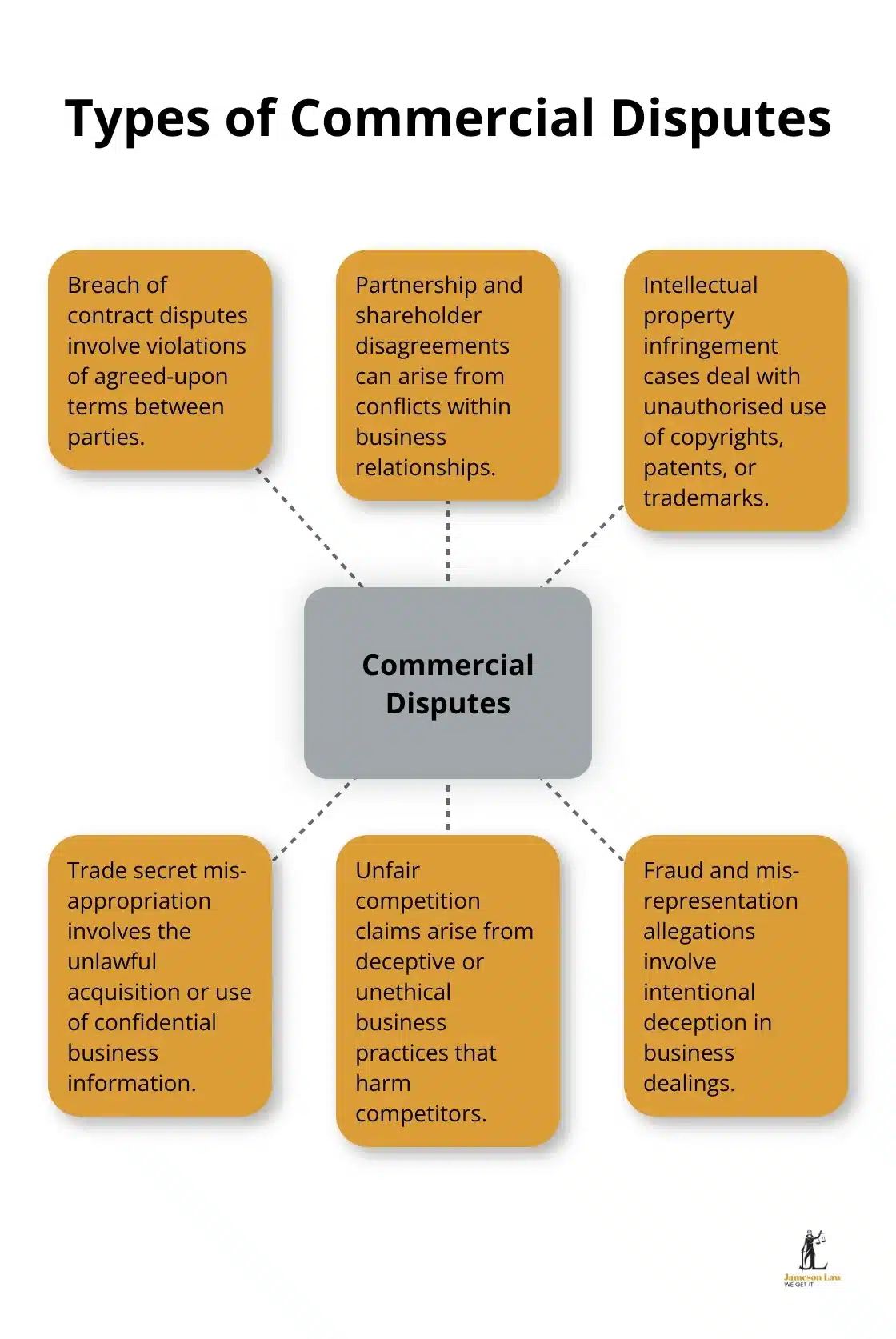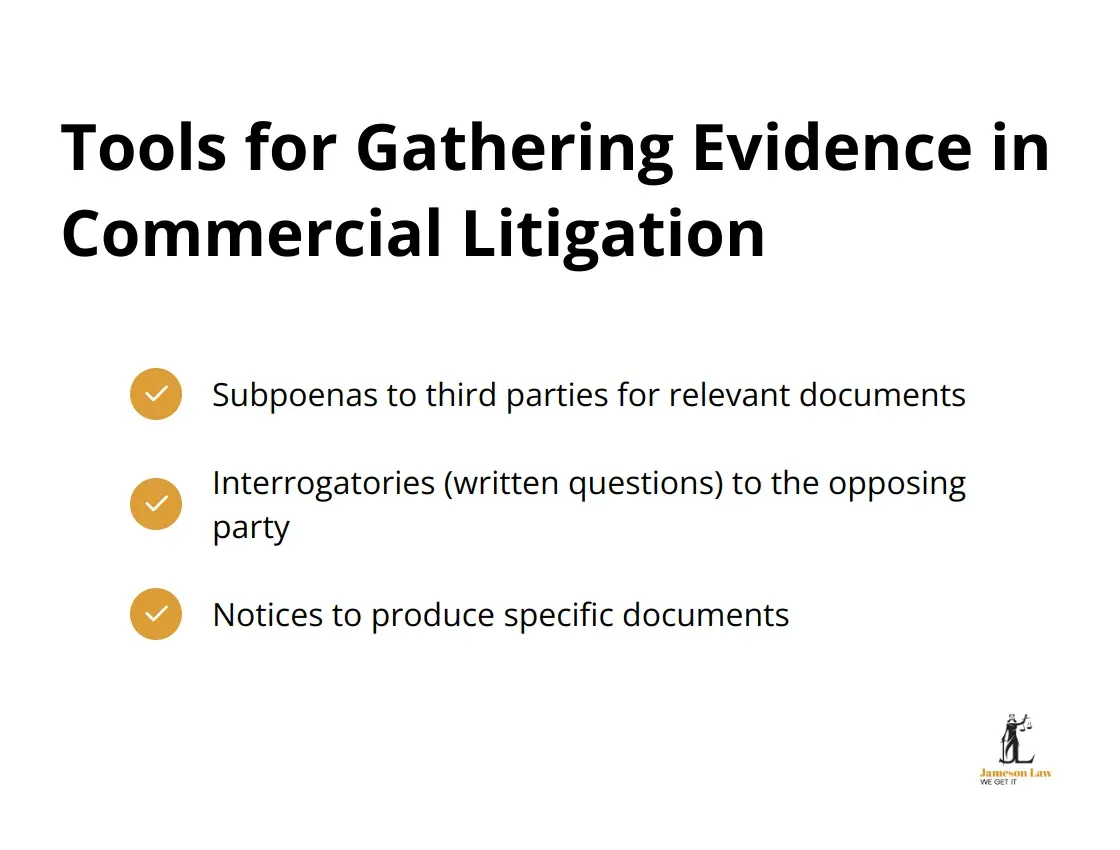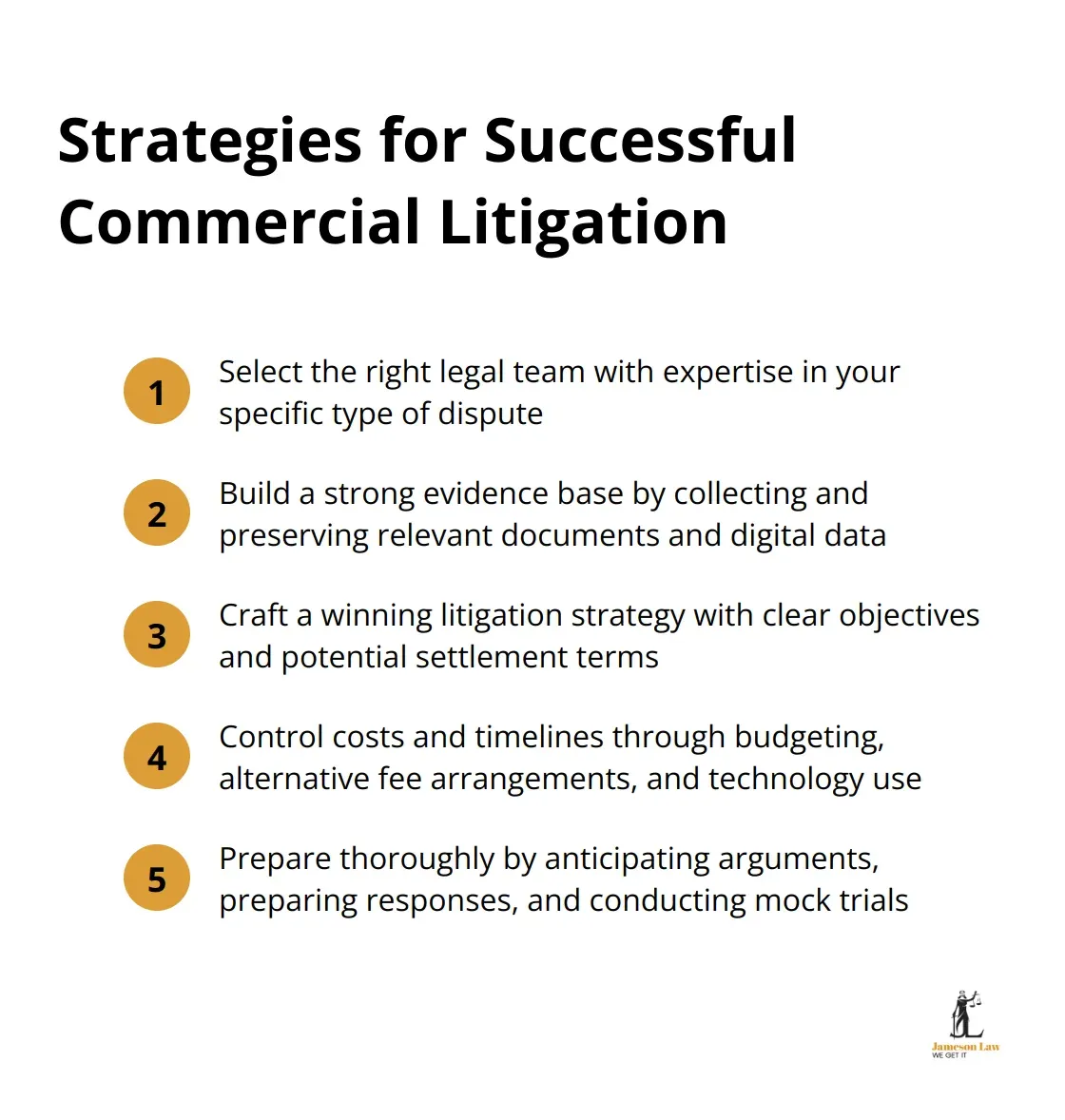Commercial litigation law can be a complex and challenging field to navigate. At Jameson Law, we understand the intricacies of business disputes and their potential impact on your company’s future.
Our blog post will guide you through the essentials of commercial litigation, from understanding its scope to mastering effective strategies for success. We’ll also explore the specific process in New South Wales, helping you prepare for what lies ahead in your legal journey.
What Is Commercial Litigation?
Commercial litigation involves legal disputes arising from business relationships and transactions. These disputes often encompass complex financial matters, contractual disagreements, or conflicts between companies. The scope of commercial litigation is broad, affecting businesses of all sizes across various industries.
Types of Commercial Disputes
Commercial litigation covers a wide range of business-related conflicts. Some of the most common types include:
![]() Breach of contract disputes
Breach of contract disputes
![]() Partnership and shareholder disagreements
Partnership and shareholder disagreements
![]() Intellectual property infringement cases
Intellectual property infringement cases
![]() Trade secret misappropriation
Trade secret misappropriation
![]() Unfair competition claims
Unfair competition claims
![]() Fraud and misrepresentation allegations
Fraud and misrepresentation allegations
Each dispute type requires a unique approach and deep understanding of both the law and business practices.

Commercial vs Civil Litigation: Key Differences
While commercial and civil litigation share similarities, important distinctions exist:
![]() Complexity: Commercial cases involve more intricate financial and business issues.
Complexity: Commercial cases involve more intricate financial and business issues.
![]() Parties involved: Commercial litigation typically involves businesses or business entities, while civil litigation can include individuals in personal disputes.
Parties involved: Commercial litigation typically involves businesses or business entities, while civil litigation can include individuals in personal disputes.
![]() Monetary value: Commercial cases tend to have higher monetary stakes.
Monetary value: Commercial cases tend to have higher monetary stakes.
![]() Specialised knowledge: Commercial litigation often requires expertise in specific business sectors or industries. Legal teams with backgrounds in finance, technology, and other relevant fields provide comprehensive representation.
Specialised knowledge: Commercial litigation often requires expertise in specific business sectors or industries. Legal teams with backgrounds in finance, technology, and other relevant fields provide comprehensive representation.
![]() Alternative dispute resolution: Commercial cases place stronger emphasis on alternative dispute resolution methods (such as mediation and arbitration).
Alternative dispute resolution: Commercial cases place stronger emphasis on alternative dispute resolution methods (such as mediation and arbitration).
The Importance of Early Intervention
Early intervention and strategic planning play key roles in managing commercial disputes effectively. Identifying potential issues early and developing a robust legal strategy often helps businesses avoid costly and time-consuming litigation.
Choosing the Right Legal Representation
Selecting experienced legal counsel is paramount in commercial litigation. Lawyers with a track record in handling complex business disputes can provide invaluable guidance throughout the process. They can help navigate the intricacies of commercial law, develop effective strategies, and work towards favourable outcomes.
As we move forward, we’ll explore the specific steps involved in the commercial litigation process in New South Wales, providing you with a roadmap for what to expect should you find yourself embroiled in a business dispute.
How Commercial Litigation Works in NSW
Pre-Litigation Steps
Commercial litigation in New South Wales follows a structured process to resolve business disputes efficiently. The first step typically involves sending a formal demand letter. This document outlines the dispute and the desired outcome, giving the other party an opportunity to resolve the issue without court intervention.
If the demand letter doesn’t lead to a resolution, alternative dispute resolution (ADR) methods often follow. NSW courts strongly encourage ADR, particularly mediation. While litigation is sometimes necessary, ADR can often lead to quicker and less costly resolutions.
Filing a Lawsuit
When ADR fails to resolve the dispute, the next step is to file a lawsuit. In NSW, this process involves lodging a Statement of Claim with the appropriate court. The choice of court depends on the claim’s value and complexity:
![]() Local Court: For disputes under $100,000
Local Court: For disputes under $100,000
![]() District Court or Supreme Court: For larger disputes
District Court or Supreme Court: For larger disputes
After filing, the defendant has 28 days to respond with a Defence. A failure to respond can result in a default judgment against them. This tight timeline underscores the importance of prompt action when served with a Statement of Claim.
Discovery and Evidence Gathering
Discovery represents a critical phase where parties exchange relevant documents and information. Rules 5.2 and 5.3 of the Uniform Civil Procedure Rules 2005 (UCPR) provide essential guidelines on discovery aimed at identifying or locating prospective defendants.
During discovery, parties can use various tools to gather evidence:
![]() Subpoenas to third parties for relevant documents
Subpoenas to third parties for relevant documents
![]() Interrogatories (written questions) to the opposing party
Interrogatories (written questions) to the opposing party
![]() Notices to produce specific documents
Notices to produce specific documents
Effective use of these tools can significantly strengthen a case. However, it’s important to balance thoroughness with cost-effectiveness. Overly broad discovery requests can lead to unnecessary expenses and delays.

Trial Proceedings
If a case proceeds to trial, a judge (without a jury) hears most NSW commercial cases. NSW statistics indicate that defendants are more likely to be acquitted by a judge alone. The trial process involves:
![]() Opening statements from both parties
Opening statements from both parties
![]() Presentation of evidence and witness testimony
Presentation of evidence and witness testimony
![]() Cross-examination of witnesses
Cross-examination of witnesses
![]() Closing arguments
Closing arguments
After the trial, the judge delivers a judgment. This can take weeks or even months, depending on the case’s complexity. The judgment outlines the decision and any damages awarded.
It’s worth noting that settlement negotiations can continue even during trial. Many cases settle “on the courthouse steps” or during the trial itself.
Navigating the Complexities
The commercial litigation process in NSW involves numerous intricacies and potential pitfalls. Businesses facing legal disputes should consider seeking expert legal advice to navigate these complexities effectively. A skilled commercial litigation lawyer can provide valuable guidance at each stage of the process, from pre-litigation steps to trial proceedings (and even post-trial matters if necessary).
As we move forward, we’ll explore strategies for successful commercial litigation, including how to choose the right legal representation and develop a strong case strategy.
How to Win Your Commercial Litigation Case
Select the Right Legal Team
The foundation of a successful commercial litigation strategy rests on choosing the right legal representation. Look for lawyers with a proven track record in your specific type of dispute. If you’re dealing with a breach of contract case, seek out attorneys who have successfully handled similar cases in your industry.
When you select your legal team, ask about their success rate, their approach to similar cases, and their strategy for your specific situation.
Build a Strong Evidence Base
The collection and preservation of evidence form the bedrock of your case. Start to collect relevant documents, emails, and other communications as soon as you anticipate a dispute. The Australian Securities and Investment Commission (ASIC) recommends the maintenance of thorough business records for at least seven years. This practice not only helps with compliance but also provides a solid foundation for potential litigation.
Digital evidence plays an increasingly important role. Implement a system to preserve electronic data, including metadata. Federal Court requirements for electronic discovery of documents and preservation of metadata offer guide-lines on the management of electronic documents in litigation.
Craft a Winning Litigation Strategy
The development of a strong case strategy requires more than just knowledge of the law. It demands a deep understanding of your business, the industry, and the potential implications of the case outcome. Your strategy should outline clear objectives, potential settlement terms, and a timeline for key decisions.
An effective approach involves the conduct of a cost-benefit analysis at each stage of the litigation. This helps you make informed decisions about whether to proceed, settle, or explore alternative dispute resolution methods. The NSW Supreme Court reports that about 95% of civil cases settle before trial, which highlights the importance of a flexible strategy.

Control Costs and Timelines
Commercial litigation can prove expensive and time-consuming. To manage costs effectively, consider:
![]() The establishment of a realistic budget with regular reviews
The establishment of a realistic budget with regular reviews
![]() The exploration of alternative fee arrangements with your legal team
The exploration of alternative fee arrangements with your legal team
![]() The use of technology to streamline document review and case management
The use of technology to streamline document review and case management
You can manage timelines through the establishment of clear milestones and deadlines with your legal team. Prepare for potential delays, especially during the discovery phase (which can often extend the timeline).
Prepare Thoroughly
Thorough preparation can significantly impact the outcome of your case. This includes the anticipation of the other party’s arguments, the preparation of robust responses, and the assurance that all your witnesses are well-prepared for depositions and trial testimony.
Mock trials and practice sessions (which can reveal weaknesses in your case) help refine your strategy before you step into the courtroom.
Final Thoughts
Commercial litigation law demands expertise, strategic thinking, and thorough preparation. We explored key aspects of commercial litigation, from its definition to specific processes in New South Wales and strategies for success. Understanding nuances of commercial disputes (such as breach of contract, partnership disagreements, and intellectual property infringement) is essential for businesses navigating the legal landscape.
The commercial litigation process involves several stages, each requiring careful consideration and expert guidance. Successful commercial litigation depends on selecting the right legal team, building strong evidence, crafting winning strategies, and controlling costs and timelines. These elements create a robust approach to resolve business disputes effectively.
At Jameson Law, we specialise in commercial litigation law and offer expert legal services tailored to your specific needs. Our team provides the support and expertise you need to navigate the challenges of commercial litigation successfully. Whether you face a potential lawsuit or seek to protect your business interests, we stand ready to assist you.













